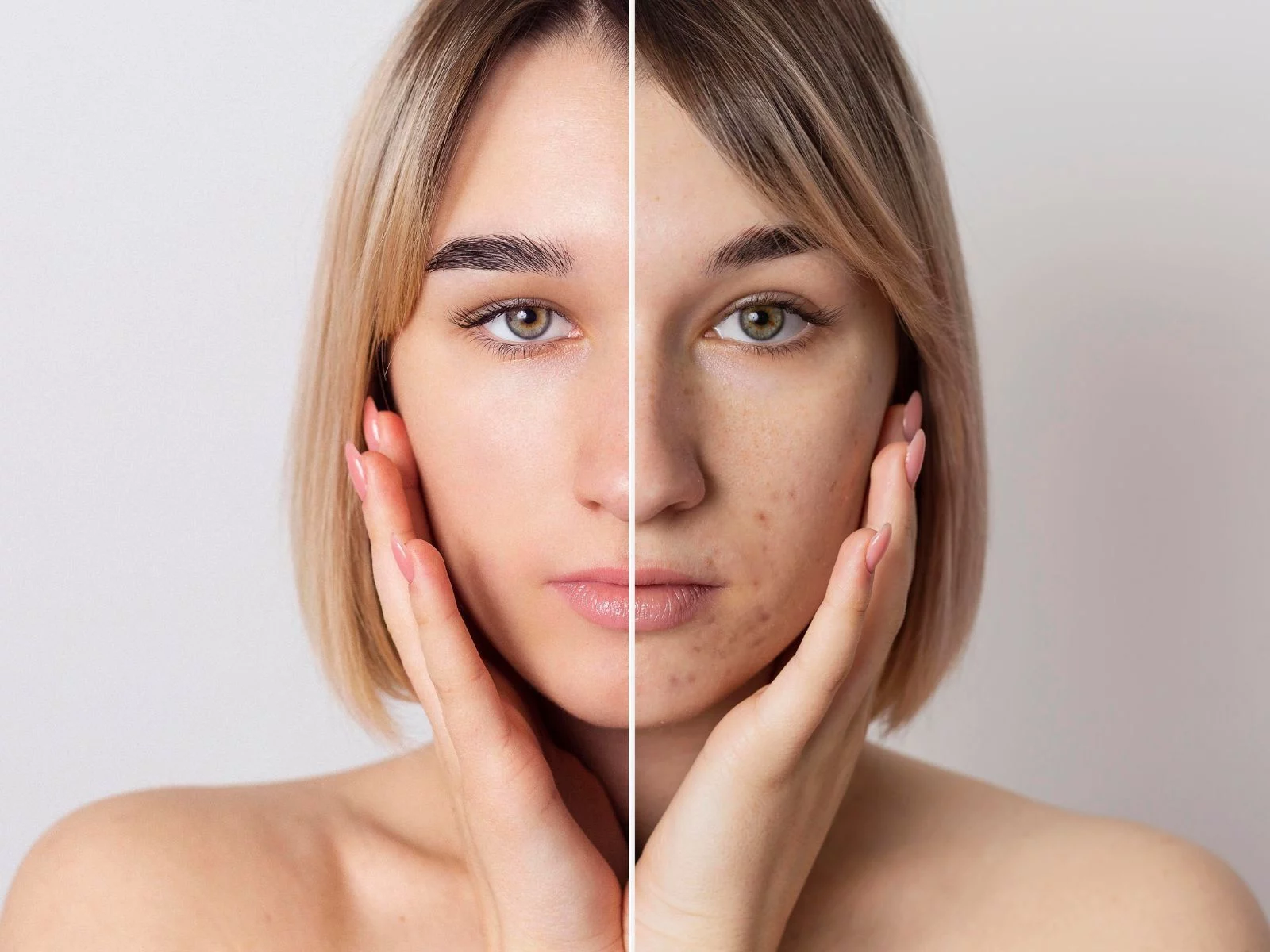Your skin and health reflect what you eat, and you might already know certain things are bad for your skin, such as oily foods, fried food, sugary food, and many more. These foods may negatively impact your skin, producing everything from acne to dull skin.
But, if there’s one thing that every dietitian has been talking about recently, it’s gluten. You might think this is just another food trend, but according to research, gluten can potentially cause major skin and health problems.
So what is gluten? Gluten refers to the proteins present in wheat (wheatberries, durum, emmer, semolina, spelt, farina, graham, and einkorn), rye, barley, and wheat-rye hybrid. These are basically part of every cuisine, and your favorite meals like pizza, bread, and pasta all contain gluten.
Moreover, it acts as a glue that keeps food together, allowing it to keep its structure. Gluten may be present in a wide variety of foods, and you’ll be surprised to know that you consume gluten on a daily basis.
Many people are allergic to gluten, and although you are not allergic, consuming gluten can still impact your skin and body in more ways than you might think. So if you want to know in which ways gluten can affect your skin and face so, keep on reading!
How to know whether you are gluten intolerant or not?
According to studies, even if you do not have Celiac Disease (CD), gluten can have an effect on your health, including your skin. We all consume gluten in our everyday meals as it’s an integral part of every cuisine.
However, Gluten cannot be consumed by Celiac Disease patients without causing serious illness. As a person who is suffering from CD if they consume gluten, his immune response will get triggered, and thus, there can be some serious repercussions of that. Although only 1 percent of people have this allergic reaction to gluten.
Since everyone has a different reaction to any particular allergen. However, you might be gluten-sensitive or gluten intolerant, with more subtle repercussions. Non-Celiac Gluten Sensitivity (NCGS) is a new condition that has just been recently found. NCGS patients do not have the autoimmune disorder Celiac Disease since they do not have a typical reaction to wheat.

Your body might be showing you symptoms in many ways, you need to observe and understand your body. These symptoms can be as mild or severe as
- Forgetting thoughts in the middle of a sentence, difficulty finding words, and poor attention. This is known as brain fog, as we often ignore it.
- Gluten can have an effect on your neurotransmitters, causing sadness and anxiety, among other mood problems. Having sudden mood swings.
- Gastrointestinal problems like Irritable bowel syndrome, diarrhea, gas, and constipation.
These are some symptoms that we usually ignore, and if we dont take timely steps, it can lead to severe diseases like dermatitis, ataxia, schizophrenia, hypothyroidism, and many more.
How can gluten impact your face and skin?
There are several skin issues associated with consuming gluten. However, If you have acne-prone skin, gluten might worsen the condition. As gluten is inflammatory in nature and can cause skin responses and aggravate breakouts.
Furthermore, gluten is known to elevate insulin levels, which can intensify skin issues, particularly acne. So, if you’ve been experiencing frequent breakouts, it’s time to cut back on gluten to help your skin clear up. Other than causing acne, there are many other serious issues that can happen because of gluten intolerance.
Eczema
Eczema is a very prevalent and common skin issue that is characterized by itchy, irritated skin. Although gluten has been linked to eczema, this is not true for everyone.

As many people have found out that the main cause of their skin issues can be foods like gluten and dairy, as well as common allergens like soy, citrus, peanuts, seafood, eggs, maize, and tomatoes. Thus, avoiding such food items can make a significant impact.
Skin dryness
One of the most significant ways gluten affects you is by impairing your body’s capacity to absorb nutrients such as Vitamin A and E, both of which are essential to your skin since they keep it supple and moisturized at all times.
Furthermore, your intestines have a tough time processing gluten, which leads to digestion and gastrointestinal issues, which in turn leads to skin problems like dryness and other issues.
Premature aging
The intake of gluten-induced foods such as wheat may be the cause of your skin becoming dull and aging faster than it should. Gluten has a significant impact on your body’s collagen levels.
Wheat, you see, converts to sugar far faster than anything else in the body. This mechanism, in addition to boosting insulin levels, has a direct influence on collagen levels. When your skin loses collagen, you lose the protein that makes your skin supple and firm. In its absence, you begin to see fine lines, crow’s feet, and wrinkles all over your skin.
How can Gluten impact your Health?
First of all, let me tell you Gluten has no essential protein or nutrient. But still, it’s a part of our everyday diet. However, if you are not suffering from CD doesn’t mean gluten is not affecting you. Gluten can impact you in many other ways, like
Bloating
Bloating is a common issue faced by people consuming gluten. This can make your abdomen feel swollen and also make you feel uncomfortable and uneasy. However, if you are also experiencing bloating, this might mean you are also intolerant to gluten, or you might have Non-Celiac Gluten Sensitivity (NCGS). Moreover, it can also be caused by dairy products as well so switch to other plant-based alternatives like oat milk.
Fatigue
Fatigue or feeling exhausted is normal, but if you feel drained all the time, this might be a sign that your body is telling you. Most people ignore fatigue and overlook it. But this can be a symptom of any serious underlying issue.
If you experience fatigue right after consuming gluten, this might be an indication that you have gluten intolerance or sensitivity.
Anxiety issues
People who are gluten intolerant are more likely to have anxiety issues or depression. The percentage of people having mental health issues is rising, and there can be many causes behind this. However, people with gluten sensitivity are more prone to have anxiety issues.
Many people who are already diagnosed with CD have reported that they have experienced some anxiety or depression. Moreover, according to various reports, gluten can trigger a feeling of depression on its own and can make you feel stressed, worried, uneasy, or uncomfortable.
Severe stomach pain
Abdominal issues are a major sign of gluten intolerance or sensitivity. However, almost 90 percent of people experiencing CD have this symptom. As gluten induces inflammation in the digestive tract, which causes severe stomach pain.
How to become gluten-free?
After going through the above discussion, you must have realized that gluten can impact you in so many ways. Moreover, it’s not providing any essential nutrients, but still, it’s a part of our everyday diet. So how can we eliminate gluten from our diet?

As people are becoming more aware of the impact of gluten. Thus, gluten-free alternatives are easily available in every grocery store. Moreover, giving up gluten is way easier as it won’t affect the taste of the product.
Having a gluten-free diet gives you many benefits first of all, you’ll feel much more energetic, and you’ll get the maximum benefits from your diet.
With that being said, gluten-free products might be expensive compared to the basic product. However, if you dont have any medical reason to completely avoid gluten, you can still minimize the consumption of it.
By switching to healthy gluten-free options like rice, quinoa, millet, and corn. Moreover, there are many natural foods that are naturally gluten-free such as fruits, legumes, vegetables, nuts, and many others. Taking these natural products can minimize the consumption of gluten. This way, you can have much healthier skin and body naturally.















